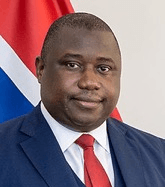In light of a recent article released by The Republic, the Government of The Gambia has provided a formal statement outlining the legal framework and organised procedure it adhered to during the sale of assets confiscated from former dictator Yahya Jammeh. The government highlights its dedication to transparency and accountability, stressing that the entire process was carried out under stringent legal oversight and consistent auditing.
The government responded to the article, The Assets of Gambia’s Former Dictator Go for a Song, published on May 1, 2025, clarifying that the disposal of Jammeh’s assets followed a two-stage, legally established process. The initial phase, as outlined in the statement, entailed the supervision of the Janneh Commission, a Presidential Commission of Inquiry formed in accordance with the Constitution of The Gambia. This commission, acting within its legal authority, recommended the forfeiture and sale of assets considered to have been unlawfully acquired. The assets comprised livestock and agricultural equipment, including cattle, sheep, and tractors. The Commission issued a public report based on its findings.
“The Government of The Gambia acknowledges the article published by The Republic on 1 May 2025 titled “The Assets of Gambia’s Former Dictator Go for a Song.” The Government aims to clarify that the asset disposal adhered to a two-stage, structured, and legally sound process. The initial phase involved the disposal of certain assets, overseen by the Janneh Commission, a Presidential Commission of Inquiry established in accordance with the Constitution of The Gambia. The Commission, exercising its vested powers, recommended the forfeiture and disposal of assets identified as unlawfully acquired and published a report accessible to the public regarding this matter. The government stated, “These assets included cattle, sheep, and tractors.”
The government explained that the second stage involved the establishment of a Ministerial Taskforce to supervise the implementation of the Commission’s recommendations. The Taskforce comprised the Ministers of Justice, Local Government and Lands, Tourism and Culture, and Agriculture. A Technical Committee, consisting of permanent secretaries and senior officials from pertinent ministries, reviewed and approved the proposed sales of the assets.
The government asserted that the assets were sold via a competitive bidding process, which followed comprehensive valuation and public advertisements. Alpha Kapital Advisory was designated as the Receiver, responsible for overseeing the sales process, which involved consistent reporting to the government.
“A Technical Committee composed of permanent secretaries and officials from pertinent ministries conducted a review of the assets and provided recommendations for the Ministerial Taskforce’s approval.” The asset sale was carried out via a competitive bidding process, after conducting valuation exercises and public advertisements. A Receiver, Alpha Kapital Advisory, was engaged to oversee this process, and regular reports were provided to the Government,” they stated.
The government has reaffirmed its dedication to transparency and the public good during the asset recovery process.
“The procedures implemented were clear and focused on optimising value from the recovered assets. All assets sold to date have undergone an audit by the National Audit Office, and the report will be presented to the National Assembly. The Government is dedicated to ensuring complete accountability and transparency. The statement articulates.
A comprehensive report on the sales of all forfeited assets will be made available to the public in due course. This report will include details on the processes, beneficiaries, sale prices, and proceeds.
“In line with this, a thorough report outlining the sales of all forfeited assets including the procedures followed, beneficiaries, sale prices, and proceeds realized will be made accessible to the public in due time. The Government reiterates its dedication to maintaining the rule of law and ensuring that the resources of the Gambian people are managed with responsibility,” they said.


